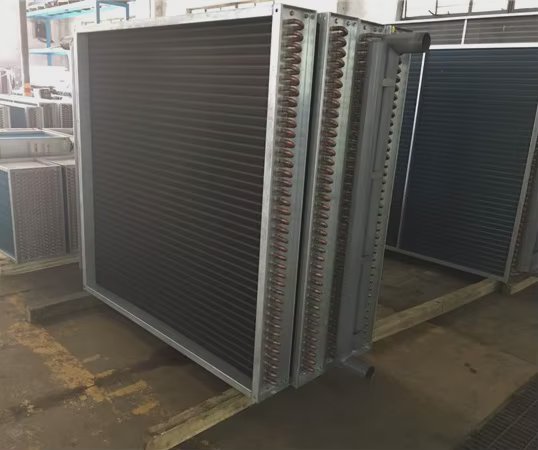Microchannel heat exchangers (MCHEs) have rapidly become a cornerstone of modern cooling and heating systems, renowned for their compact design, energy efficiency, and enhanced performance across various industries. As demands for more sustainable and efficient technologies grow, the next generation of microchannel heat exchangers promises to push the boundaries of what is possible in thermal management. These emerging trends highlight the innovations shaping the future of MCHE technology and its expanding role in industrial and commercial applications.
Advanced Materials for Greater Durability and Efficiency
One of the most exciting trends in the development of microchannel heat exchangers is the exploration of new materials that offer enhanced performance and durability. While aluminum has been the material of choice due to its excellent thermal conductivity and lightweight properties, the next generation of MCHEs is likely to incorporate composite materials, advanced alloys, and even nanomaterials.
These new materials aim to improve heat transfer efficiency while increasing resistance to corrosion and wear, particularly in harsh environments. For instance, composite materials that combine the strength of metals with the flexibility and resilience of polymers could offer a new level of durability for applications where traditional materials might fail. Nanomaterials, on the other hand, hold promise for further enhancing thermal conductivity at a microscopic level, leading to even more efficient heat exchange.
The use of these advanced materials will extend the lifespan of microchannel heat exchangers, reduce maintenance needs, and provide more robust solutions for industries such as automotive, aerospace, and HVAC, where reliability is paramount.
Integration with Smart Technologies
As industries move towards more connected and data-driven operations, the integration of smart technologies with microchannel heat exchangers is becoming a key focus. The next generation of MCHEs is expected to feature embedded sensors and IoT (Internet of Things) capabilities that enable real-time monitoring and control of thermal management systems.
Smart microchannel heat exchangers will allow for precise temperature control, predictive maintenance, and system optimization by continuously gathering and analyzing data on performance and operating conditions. This level of insight enables operators to detect potential issues before they escalate, schedule maintenance at optimal times, and adjust system settings to maximize efficiency.
The integration of AI (artificial intelligence) and machine learning algorithms could further enhance the capabilities of these smart systems, enabling them to learn from historical data and automatically make adjustments to improve performance. This trend towards smarter, more autonomous MCHE systems aligns with broader industry shifts towards automation and Industry 4.0, where data and connectivity drive operational improvements.
Enhanced Customization and Flexibility
As industries increasingly demand specialized cooling solutions, customization is becoming a significant trend in the development of microchannel heat exchangers. The next generation of MCHEs will be designed with greater flexibility, allowing manufacturers to tailor solutions to specific applications and performance requirements.
Whether it’s adjusting the size and shape of the heat exchanger, optimizing the microchannel layout, or selecting materials that suit particular environmental conditions, enhanced customization will ensure that MCHEs can meet the unique needs of each application. This flexibility is especially valuable in industries like data centers, renewable energy, and electric vehicles, where precise cooling is critical to system efficiency and longevity.
Manufacturers are also likely to embrace modular designs that make it easier to scale and adapt MCHE systems as operational needs evolve. These modular solutions will allow for quicker installations, easier upgrades, and more streamlined maintenance, further supporting the trend towards efficient, customizable cooling solutions.
Environmental Impact and Regulatory Compliance
As global environmental regulations continue to tighten, the next generation of microchannel heat exchangers will place a stronger emphasis on sustainability. Reducing the environmental impact of cooling systems is critical for industries seeking to meet carbon reduction targets and comply with new regulations governing energy efficiency and refrigerant use.
Future MCHEs will be designed to work with refrigerants that have low global warming potential (GWP), minimizing their contribution to climate change. Additionally, innovations in manufacturing processes aim to reduce the carbon footprint of producing these systems, with a focus on minimizing material waste and energy consumption.
For industries looking to upgrade their systems with the latest in sustainable MCHE technology, companies like Kaltra offer advanced solutions designed to meet these emerging environmental standards. Kaltra’s https://kaltra.com/microchannel-heat-exchangers are engineered with both efficiency and sustainability in mind, providing high-performance options that align with the industry’s future-focused goals.
Expanding Applications and New Markets
The versatility of microchannel heat exchangers is leading to their adoption in a growing number of industries. As next-generation MCHEs continue to evolve, their applications are expanding beyond traditional markets like HVAC and automotive to include sectors such as renewable energy, medical devices, and electronics cooling.
In renewable energy, for example, microchannel heat exchangers are playing an increasingly important role in improving the efficiency of solar power and wind energy systems. In the medical field, the precise thermal control offered by MCHEs is crucial for maintaining the integrity of sensitive equipment and processes, such as MRI machines and pharmaceutical manufacturing.
As these new markets emerge, the next generation of microchannel heat exchangers will need to adapt to meet the specific requirements of these applications, driving further innovation in design, materials, and performance.
Shaping the Future of Thermal Management
The next generation of microchannel heat exchangers is set to transform the landscape of thermal management across industries. With advancements in materials, smart technologies, and customization, these systems will continue to push the boundaries of efficiency, reliability, and sustainability. As manufacturers embrace these innovations, microchannel heat exchangers will remain at the forefront of cooling technology, offering solutions that meet the demands of an increasingly connected and environmentally conscious world.

